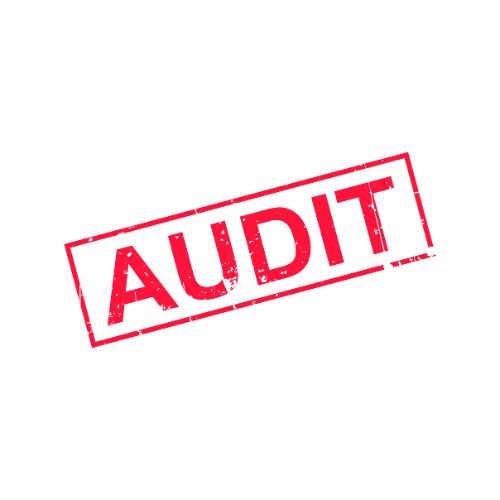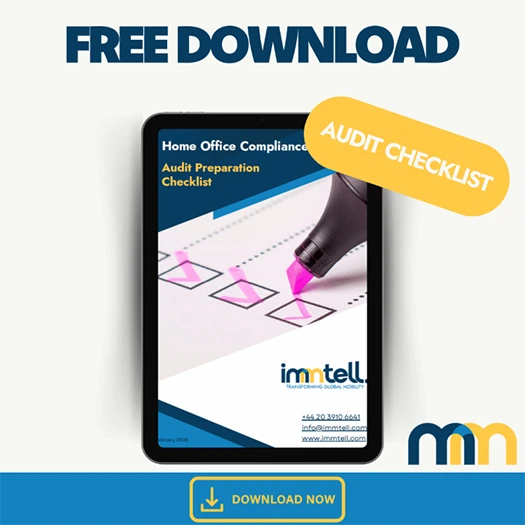Why Right to Work Checks Alone Won’t Keep You Compliant
What UK sponsors overlook, and why it’s costing them.

Why Employers Still Worry About Immigration Compliance
You’ve hired someone great. You’ve checked their passport, followed the right to work checklist, and taken a copy. You think you’re covered.
But deep down, you still have that uneasy feeling.
What if a Home Office visit uncovers something you didn’t know you were supposed to do? What if you’re hit with a fine or, worse, lose your sponsor licence?
If you're responsible for hiring or HR, this is a very real concern, especially if your business relies on Skilled Worker visas or temporary migrant labour. You've got enough on your plate already, and immigration compliance often feels like a side job you never signed up for.
At Immtell, we speak to employers every day who believed they were fully compliant, until a surprise audit, suspension, or refusal woke them up to the bigger picture.
This article will help you understand:
- What right to work checks do cover (and what they don’t)
- Where most businesses go wrong
- What’s changed in 2025 that’s catching people out
- How to protect your business from disruption, fines, or licence loss
Let's break that down.
What Right to Work Checks Are (and What They’re Not)
Right to work checks are a legal requirement for every employee in the UK. Whether someone is British, a visa holder, or an EU national with Settled Status, you must confirm they have the right to work before they start.
In practical terms, this often means:
- Checking original ID documents or using the Home Office’s online service
- Making sure the person is allowed to work in the job you’re offering
- Keeping a copy of the evidence, dated, and stored securely
Doing this properly protects you with what’s called a statutory excuse, meaning you’re protected from a civil penalty (a large fine) if someone turns out not to have the right to work.
But here’s the problem: right to work checks alone don’t make you compliant if you hold a Home Office sponsor licence.
The Illusion of Compliance: Why It’s Not Enough
Many UK businesses assume that because they’ve completed the right to work checks, they’re in the clear.
We’ve seen this story play out far too often:
- A care provider is hit with a Home Office visit. They’ve done right to work checks and kept passport copies. But they’ve failed to report a delayed start date or have no evidence the job was real.
- A fintec company sponsors developers and files all their documents. But they’ve changed a worker’s hours without updating the Home Office. They thought right to work was the main thing.
- A startup hires a recent graduate and ticks the boxes for the right to work. But the salary was £1,000 short of the minimum requirement, and the visa is later cancelled.
In each of these cases, the business did what they thought was right. They checked the documents. They made sure the visa was valid. They even kept everything on file.
But they didn’t realise they were missing sponsor-specific duties. And that’s what the Home Office cares about.
The Wider Sponsor Duties You’re Probably Missing
The Wider Sponsor Duties You’re Probably Missing
If you hold a sponsor licence, you’ve signed up to a contract with the Home Office—whether you realise it or not.
That contract goes far beyond the initial right to work check. It includes:
1. Record-Keeping Duties
You must keep specific records for each sponsored worker. That includes:
- Full job descriptions and evidence of genuine vacancies
- Up-to-date contact details
- Salary and contract information
- Absence records
- Evidence of how the role was filled (if required)
2. Reporting Duties
Certain changes must be reported via the Sponsor Management System (SMS) within strict timeframes. These include:
- Delayed starts (over 28 days)
- Changes in job location, hours, duties, or pay
- Absences without permission
- Resignations, terminations, or visa refusals
- Change in sponsor address or key personnel
Missing a deadline or not reporting at all can trigger compliance action, even if the worker remains in the role.
3. Vacancy and Role Validity
Your job offer must:
- Match an eligible occupation code
- Pay the correct salary (based on the latest rules, which changed in April 2024 and again in April 2025)
- Be a genuine vacancy, not just created to fit a candidate
The Home Office can and will request additional documents to assess whether the role is real and appropriately filled. Right to work checks won’t help you here.

The Risks: What Happens When You Get It Wrong
Many employers don’t realise how high the stakes are.
Here’s what you could face if you rely solely on right to work checks and overlook your sponsor duties:
- Civil Penalties – Up to £60,000 per worker for illegal employment
- Sponsor Licence Suspension or Revocation – Which means you lose all sponsored workers
- Visa Refusals or Cancellations – Often triggered by underpayment, poor records, or inconsistent reporting
- Damage to Reputation – Particularly in regulated industries like care, education, tech and finance
- Delays to Hiring – Especially if you need Defined CoS and the Home Office requests evidence
For some businesses, this can be the difference between steady growth and being shut out of the immigration system entirely.
Why the Home Office Focus Has Shifted
In 2025, we’re seeing an increase in:
- Requests for justification letters when submitting CoS allocation increases
- Scrutiny of salary and vacancy legitimacy
- Sponsor audits without warning (especially in care, hospitality and start-ups)
- Suspensions based on one or two missed reports or poorly kept records
This isn’t about punishing small errors. It’s about the Home Office looking for sponsors who take immigration seriously. Right to work checks are still necessary, but they're only one part of the picture.
Checklist: Are You Treating Sponsorship Like Payroll or Just a HR Tick Box?
Take a moment to assess your setup. Can you confidently say:
- You’re storing and updating the required sponsor records?
- You’re reporting changes within the required timelines?
- Your CoS justifications match the vacancy details?
- You’ve reviewed your processes since the 2024/2025 rule changes?
If you answered “no” or “not sure” to any of the above, you’re not alone, but you are exposed.

How Immtell Helps You Stay Fully Compliant (Not Just Legally Safe)
At Immtell, we go beyond basic legal requirements.
We’re a regulated immigration consultancy, founded by a former senior Home Office official and ex-Big 4 leader. We understand how the system really works—from both sides.
Here’s how we help:
- Mock Compliance Audits – We simulate a Home Office visit and produce a risk a report with a practical action plan
- Monthly Retainer Packages – Sponsor licence guidance, reporting support, and access to phone support whenever needed
- Sponsor Compliance and Right to Work Training - Practical, plain-language training for HR and leadership teams, delivered live or on-demand.
Our fixed-fee model gives you clarity:
- Monthly Support Packages typically start from £500.
You’ll never be left guessing what’s expected or what it will cost.
What to Do Next
If you're relying on right to work checks alone, now is the time to act.
You don’t need to panic, but you do need a plan. Start with an honest look at your internal processes. Then speak to someone who deals with this every day.
We’ve helped startups, multinationals, care groups, and everything in between. Whether you need one-off advice or ongoing support, we can help you tighten things up before the Home Office comes calling.
Ready to talk?
Book a short discovery call with our team, and we’ll explain how it works, no pressure.


Stay Compliant, Not Just Covered
Right to work checks aren’t enough. Get the hands-on support you need to stay fully compliant, before the Home Office comes knocking.
Right to work checks aren’t enough. Get the hands-on support you need to stay fully compliant, before the Home Office comes knocking.












